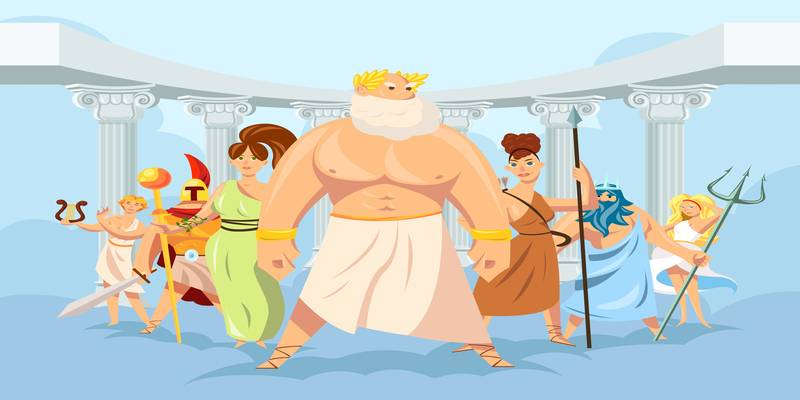Warring with the apple of discord

Greek Gods were infamous for their sharp tempers, sadistic judgments, and whimsical attitudes. The temperament of the Gods birthed many stories; some of the more famous of these were the trials of Sisyphus, the Story of Prometheus, and the epic Trojan War, among a list of others. The Trojan War, most famously covered in Homer’s Iliad, inspired generations of storytellers. From poems to plays to movies, the Trojan War stirred emotions like no other story before it had been able to. A considerable part of the success lay in how the Gods were shown in a distant yet very human light. The story did have a thundering Zeus presiding over the Greek pantheon but also the same Zeus being scared of his wife/sister Hera, listening to the bickering of his children as they chose sides in the war, and being a patriarchal figure who was also part jealous and part scared of his creation, the humans.
Looking at the story of Troy through the lens of movies
Movies are, much in the way the poets are, the conscious keepers of society. Their importance cannot be undermined as just a source of entertainment. And the movies on the famous Trojan War have been nothing short of masterpieces in terms of storytelling. Most of these movies show the story of Troy in a very general sense – Paris, the handsome prince of Ilium, visits Sparta as an emissary along with his brother Hector. There, Paris sees Helen, the most beautiful woman of all time, and falls in love. Helen, too, reciprocates his feelings, resulting in the couple eloping together to Ilium. The elopement ensues a 10-year-long war that we all know today as the Trojan War.
In this war, the gallant Achilles emerges as a hero. Being undefeated in battle, he takes on one enemy after another until a wayward arrow finds its mark in his heels, thus killing the hero who had, supposedly, no chinks in his armour. However, the original story is a lot more layered and different. It involves more than just the humans fighting to conquer but also the Gods fighting a pseudo-war through their children.
An apple that caused discord
According to mythologies, Helen was the daughter of Zeus, the mightiest of all Gods, and Leda, queen of Sparta. Helen was greatly favoured by the supreme God, who wanted her name to stay alive in the memory of mortals for ages to come. And, through a certain turn of events, Zeus’ wish took shape when the god of love, Eros, decided to shoot Helen with the arrow of love and make her fall for the handsome Trojan prince. The story starts with the marriage of Thetis, a sea nymph and mother of Achilles and Peleus. A banquet, to celebrate the union, was hosted in the halls of Olympus, and all the Gods were invited to it, all, except the goddess of strife, Eris. A consensus was reached that inviting her might lead to unpleasantness.
Writhing under the neglect of the other Gods, Eris decided to visit the party uninvited; once there, she threw a golden apple in the midst with the words “to the fairest” inscribed on it. The Goddesses, Hera (sister and wife of Zeus and goddess of familial harmony), Aphrodite (goddess of love and beauty), and Athena (goddess of wisdom and warfare), all thinking of themselves as the fairest and deserving of the apple, started fighting over it. Seeing no conclusion to the ‘strife’, they asked Zeus for his help. Zeus wasn’t the one to get caught in a family squabble. He also didn’t want to upset any of the Goddesses and decided to defer the judgment to the young prince of Troy. Paris had recently shown exemplary fairness of judgment and wisdom when he had declared Ares, the god of war, the winner of a bull competition against his own. But even he couldn’t come to a decision on the matter of the golden apple.
Seeing no way out and bent on winning, the Goddesses decided to bribe him, offering something after their fashion. Hera offered to make Paris the king of Asia and Europe, showing him riches and power beyond imagination. Athena went next and offered him infinite wisdom and skill in war. Aphrodite offered him the love of the most beautiful female in the world and showed him a vision of Helen, the wife of Menelaus. Seeing the beauty of Helen, Paris instantly fell in love and gave the golden apple to Aphrodite, thus evoking the ire of the other two Goddesses.
A sacrifice of hundred oxen for the goddess of love
If we know anything about Greek mythologies, it is that the Gods don’t let any slight go easily. They get their revenge in any twisted form and even after years. Aphrodite, in a way, did the same when she supported Paris because Menelaus had failed to please her. Helen got a lot of suitors when she was a maiden, making the decision both arduous and perilous for her father. Through the help of Odysseus and Goddess Aphrodite, he finally chose Menelaus as Helen’s partner. Menelaus had promised the Goddess a sacrifice of a hundred oxen if he won the hand of Helen in marriage. However, as soon as the prize was secured, he forgot his word. Aphrodite, not being the one to let go of such a blatant insult, convinced her son Eros to make Helen fall for Paris.
However, Menelaus’ loss allowed much bigger events to unfold. His brother Agamemnon was already looking for a reason to attack the land of horses, Ilium. Many others also felt that the insult to Menelaus could not be let go, lest it should encourage more wayward lovers in the future, and hence decided to support Menelaus in his quest to bring back his wife and bring Ilium to its knees. While Aphrodite fulfilled her promise, Hera and Athena felt insulted by Paris’ decision ad never forgave him for it. Athena actively participated in the Trojan war and supported the Greeks on their path to victory, while Hera, too, plotted the downfall of Ilium to avenge the insult at the hands of the young Trojan Prince.
What started with an apple took the form of a war that lasted for 10 years, excluding the many years the Greek fleet spent on the shores trying to get a favourable wind to sail to Ilium and the adventures that befell most Greek warriors on their return journey home. Through the years, the Gods took sides in the war, too, favouring some while sending hurt and plague the way of others. Finally, the war concluded with the Greeks tricking the Trojans into thinking that they had returned home – defeated. They left a wooden horse at the gate of Ilium as an offering to the Gods in the hopes of a safe journey home. Except the wooden horse carried a portion of the Greek army.
Drunk on success, the Trojan army welcomed the horse inside their walls and celebrated the night away, only to find themselves amid the enemy when their guards were down. What followed was a slaughter that is said to have razed Ilium to the ground, leaving few survivors to tell the tale.






